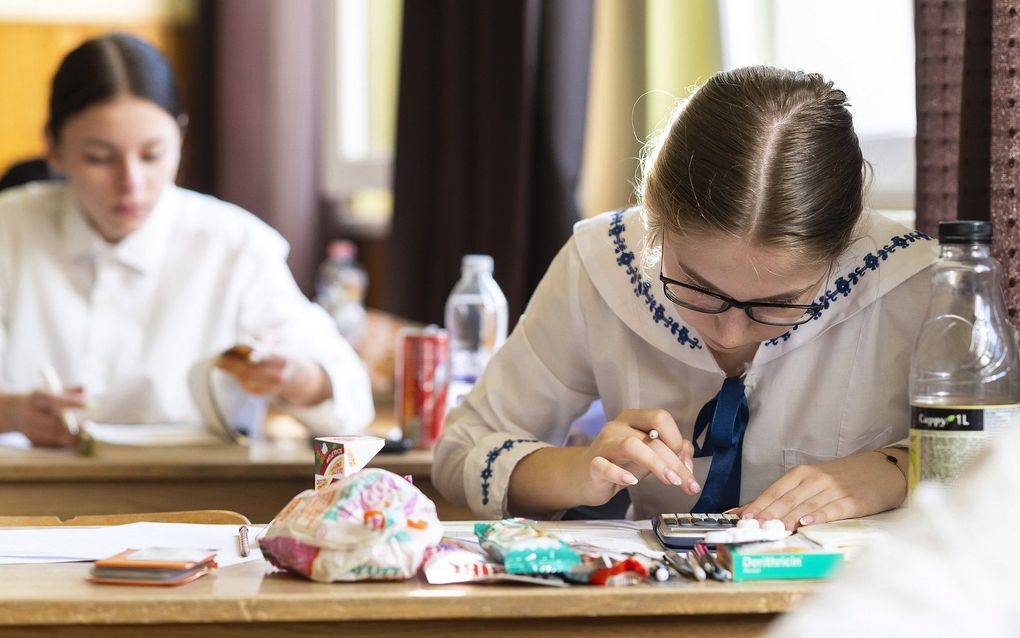Hungary supports Christian education, yet students lose their faith

Pupils sit for their mid-level final examination of mathematics in a classroom in Budapest, Hungary. Photo EPA, Szilard Koszticsak
Central Europe
Few Christian schools in Europe are so privileged as the ones in Hungary. The government fully subsidises them. That is quite rare in Europe. Yet, school leader Ábrám Tibor worries about students who leave their faith.
Christian schools in Hungary are under threat, Tibor says. But the danger comes from within, he stresses in an interview with CNE.news. Currently, he notices that seven out of ten students who graduate from his school in the Northern Hungarian town of Miskolc leave their faith as soon as they move to a different town to start studying there.
Ábrám Tibor is principal of the Lévay József Református Gimnázium és Diákotthon. His school belongs to the Reformed Church of Hungary and is located in Miscolc, in the North-Eastern part of Hungary.
The Hungarian school principal keeps a close eye on the children who attend his school, even after they graduate. "I know some student pastors in the cities where most of our students go for their study", he says. Whenever a cohort of students leaves the school to study, Tibor tells their names to the university churches so these congregations can invite the teenagers to attend the services. Yet, he notices that most students who leave his school are not interested in this and do not join a local church in their new town either. "If they get much freedom away from their home, they forget their previous education, families and faith."
Temptations
The root of the problem lies in the Christian schools, Tibor acknowledges. He believes that they have focused too little on "raising young Christian leaders who can take responsibility" in university. "We have to teach young Christians how to overcome temptations and what their priorities should be. For example, they should prioritise finding a Christian community in their new city over going to parties with friends."

Yet, the problem is not only the school's responsibility, according to Tibor. Instead, families and churches should do their part as well to preserve the faith of the youth of the congregations. Therefore, it is important that parents teach the same values at home as the children hear at school and in the church. As these values are consistent with each other, young people are less likely to leave the faith, Tibor believes. "They are much more likely to internalise Christian values when they are taught these consistently."
Programmes
At the same time, Tibor is hopeful for the future of Christian education in Hungary. Even non-believing families –"Most people in Hungary call themselves Christians, but they are not all believers"– want to enrol their children into these programmes. Even if parents themselves never attended a Christian school, they are still keen on sending their children to one, the principal notices. "The Christian schools are being recognised as good schools."
The Hungarian government plays an important role in the flourishing of Christian education, Tibor points out. He is very enthusiastic about the Orban administration, which sees the churches, including the Reformed ones, and the Christian schools as equal partners for cooperation. In addition, the principal believes that the government protects the schools from liberal influences from Western Europe by implementing what is known as the controversial Child Protection Law. It forbids schools to teach LGBT values to children. '
Expanding
Meanwhile, the Christian schools keep expanding. And even former students who left their faith when they graduated seem to trickle back into the Christian school and church system when they become parents. "I think five out of the seven students who leave their beliefs find the faith again when they get older", Tibor estimates.
Therefore, he does not think that Christian schools do their work in vain. "I think that it is the main duty of a Christian community to sow good seeds. You never know when they will bear fruits."
Related Articles









